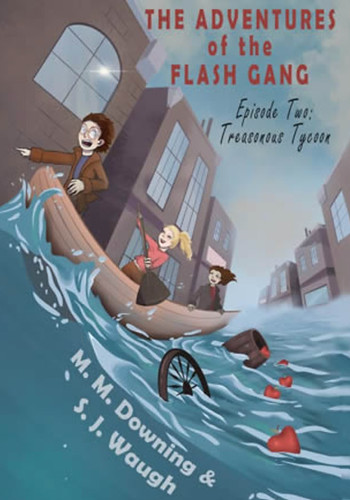The desire a parent feels to protect their child is instinctive, consuming, and, sometimes, misguided.
We are authors and mothers. Between our two families we have four children, boys and girls. Like most parents, we wish our children might grow up in a perfect world, one where they would never hurt themselves or others, never feel sad or angry, or know the pain of being lonely or alone, and never fail at anything they want to succeed at. And, okay, we know it’s a fantasy and certainly impossible, even within situations that are in our control. But then, lord help us, real life comes barging in with scary strangers and bullying classmates, school lockdowns, wrenching news of natural disasters, foreign conflicts, and foreboding futures, all underscored by a seemingly limitless social media, buzzing from our children’s back pockets with a “Be THIS! Do THAT! This is cool, you are not!” and far darker messages, if maybe they just click one more link, scroll a little further, and…. oh please!
Can’t we as parents just make it all better? Can’t we at least pretend everything is lovely?
So why did we write an historical adventure series for 8-12-year-olds involving the American Nazi movement in the 1930s?

Truthfully, we did not set out to tell a story with such dark underpinnings—our initial idea for THE ADVENTURES OF THE FLASH GANG trilogy was for a plucky orphan to outwit a scheming steel tycoon in 1935 Pittsburgh. But in researching the period, we discovered an ominous record of American citizens who supported the budding Third Reich.
The German-American Bund, the wildly popular radio host Father Coughlin and the Christian Front he inspired, William Pelley’s Silver Shirts—to name a few—were all pro-Hitler, pro-fascist, antisemitic, and eager to push America in that direction. As writers, we love to spin redeeming stories out of ugly circumstances. As parents, however, we cleave to that fantasy of keeping our children—our young readers—protected and happy. Certainly nothing in our series would appear without us putting it there, so we asked ourselves: Do we spare that moment of reckoning? Avoid the hard truths? Make the bad-guys less threatening, our country less conflicted? Should we sugarcoat history?
No.
There are indeed very necessary places to shut down the negative, protect the positive, and redirect attention. But history is not one of them.
History is our collective truth.
What happened in years past affects us here and now, its repercussions resonate into our present and there are lessons to be learned. And, unless our children never read a book, watch a documentary, or engage in conversations in or outside a classroom, etc., they are going to learn about historical events. So rather than assuming too-delicate sensibilities, we should fully embrace history as an opportunity to engage our children, to educate, and to let our being truthful deepen their trust in us.
A calm, honest description of an event will leave the door wide open for questions, valuable discussion, and the chance to share feelings and observations—exactly what we hope for in a parent-child relationship.
It also helps that history is exactly that: history, past tense, one step removed, a tale to be told. It offers a safe distance from which children can learn the good and bad and in-betweens of an event without being intimately involved.

They can observe how others coped under distressing circumstances and are given a marvelous opportunity to consider how they themselves might cope. Being informed is a way to mentally prepare, to reckon, to empathize—all powerful life skills. The one-step-removed tale is the same with fiction—in our series, for example, readers can put themselves in our street orphans’ shoes without (hopefully) ever personally experiencing abandonment, hunger, or danger. And note to us parents: being distressed by a dark event or sad story is not something to have our children avoid, rather we need to understand it is an important opportunity for them to learn how to manage their feelings, another essential life skill.
History is not pretty. But worse is the unending reserve of false, embellished, and manipulative history. A parent sugarcoating the past is no less a falsehood—and is anyone ever accepting of being lied to? Especially as a child? We can far better protect our children by offering them knowledge and the skills to cope with it.
Frankly, we’re happy to have shared a bit of America’s complicated history through our series. Historically accurate, our books are mostly unbiased (except towards kindness – we are biased toward kindness). If our readers take anything from The Flash Gang, we hope it is to face truth without fear.

ABOUT THE AUTHORS
Sandra Waugh is the author of Lark Rising and Silver Eve, books 1 & 2 in the Guardians of Tarnec series published by Random House. Prior to taking up the pen, Sandra was an actress, most notably a co-founder and one-time artistic director of Echo Repertory, a not-for-profit women’s theater company based in New York City. She holds a B.A. in English from Bryn Mawr College, a black belt in Nia and 500-hour yoga teacher certification, the latter two she sometimes teaches when not writing. Sandra lives in rural Connecticut with her husband.
Melanie Murray Downing, writing as M.M. Downing, is a freelance editor and author who has been previously published at Harlequin and HarperTeen (under the pseudonym Claire Ray.) She has a B.F.A. from New York University and worked for six years at Warner Books and Grand Central Publishing. She lives in New Jersey.
Learn more:
https://downingwaugh.com/
https://www.instagram.com/downing_waugh/
